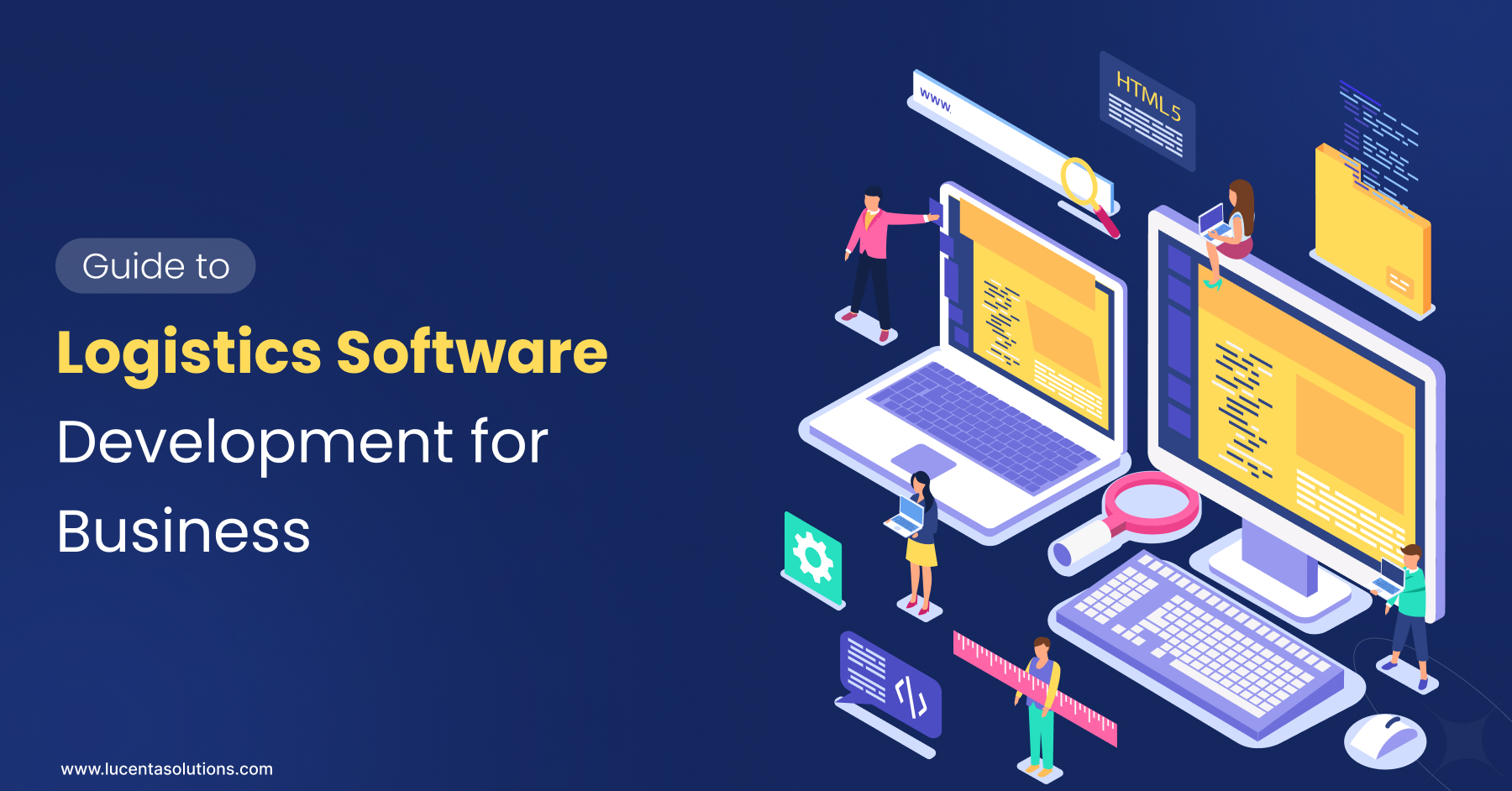Guide to Logistics Software Development for Business
Logistics comprises different transportation types, including airways, waterways, roadways, and others. Like other businesses, the shipping and transportation business is linked by data to make informed decisions. For this, a streamlined process is required, especially for a sector that heavily relies on distribution operations and planning. Here, logistics software development plays a major role in leveling up the operational activities and meeting market requirements.
According to the data by Precedence Research, the global logistics market size was USD 7.98 trillion in 2022 and is expected to reach USD 18.23 trillion by 2030 with a CAGR of 10.7% from 2023 to 2030. To meet up with this growing market size and technological development in transport and logistics, investing in the custom logistics software development process will improve logistics, sales orders, freight shipment, materials, and production management.
In this blog, we will take you through the insight of logistic management solutions, features, and the development guide.
What is Logistic Software Development?
The logistics software development process involves creating customized software to streamline and optimize supply chain and logistics operations. It comprises of developing specialized software solutions to help businesses handle logistics-related duties like order tracking, inventory control, shipping, and transportation.
The software makes it easy to access crucial information and streamline the entire process internally. It enables businesses to effectively manage workflows, from the delivery of raw materials to the delivery of completed goods to customers.
According to Statista, the worldwide supply chain management software market is expected to rise steadily and reach a valuation of more than US$10.17 billion in 2025.
In addition, supply chain management software is projected to generate US$20.17 billion in revenue by 2024. The market is expected to yield US$24.19 billion in sales by 2028, growing at a compound annual growth rate (CAGR) of 4.5% between 2024 and 2028.
How can Logistics Software for Business be Beneficial?
Since the industry is upgrading massively and investing in automated tools to streamline the process, the demand for logistics software development services has increased. There are multiple benefits a business can have by investing in logistics software. Some of these are-
Complete Automation
The main benefit of utilizing logistics software is the automation of the complete process. You can use this software to automate every procedure of your logistics and transportation business. You can handle several tasks at once, such as inventory control and billing. Within the program, you can also manage your data.
Minimal Human Involvement
Logistics software reduces human factors in several ways. Human factors include risks associated with error, overload, tiredness, and neglect. Work pressure can occasionally result in errors in document management, data management, and other areas. However, logistics software can also raise productivity and decrease manual labor by automating procedures.
Transparent Supply Chain
In the past, customers would schedule shipments and then wait to hear back by phone. But with the involvement of software, both clients and the owner can keep track of the shipment in real time. Using tracking software, a business can monitor both internal and external operations to ensure its goals are reached and build open communication with all chain participants.
Reduced Business Cost
Logistics software can save your company money on several costs. Thanks to the system’s precise calculations, you will be able to spot instances where money is spent more than is necessary, places where you may save costs, locations where you can discover better prices on goods, etc. Additionally, by employing resources and routes more effectively and removing human mistakes, you can reduce expenses.
Optimization of the Cost
Using the software, logistics businesses can optimize the cost factors. You may improve your decision-making process by using software tools like data analysis and report generation. Additionally, you will be able to contrast the various choices. Moreover, you can select the optimal choice for your company.
Dedicated Client Support
By using logistics software, businesses can improve customer service. The software enhances how well customers receive their orders and streamlines the delivery procedure. Thanks to the software, you may operate more precisely and efficiently, which enhances client service.
The Need for an Investment in Logistics App
Investing in a logistics app, just like the software, is long-term beneficial as part of logistics management solutions. Therefore, it should come as no surprise that there are numerous varieties of transportation and logistics apps. Before delving into the specifics of developing a custom mobile application for logistics, it is crucial to decide on the kind of application you will need. We’ve chosen the most well-liked varieties to simplify your business.
Fleet Management Applications
In logistics, you need to use a fleet to move your assets from point A to point B, which can cause your business to pause. Fleet management app solutions can help you maintain your vehicles. No matter the size of your fleet, this application will store, manage, and gather all the data you require about your trucks, including their maintenance history, which is essential for prompt maintenance or replacement.
Apps for On-Demand Logistics
If your trucks aren’t always wholly loaded, you could consider using an app that provides on-demand logistics services as an additional revenue stream. The following is how they operate:
- The shipper makes the request.
- The driver, who has a spare room in his vehicle, agrees to take up your cargo.
- Shippers can monitor the whereabouts of their shipments and get status updates.
- When the goods are delivered, the system will send the shipper a bill.
Uber Freight, the most widely used logistics app globally for on-demand shipments, is an excellent means of expediting the delivery of your items.
Real-Time Tracking Apps
This app can help you find your automobiles’ whereabouts, identities, and drivers. It functions on a national and worldwide level. The software provides users with real-time tracking information on the vehicles’ whereabouts, deliveries, and routes.
Apps for Warehouse and Inventory Management
To ensure that every shipment arrives at its destination on schedule, you can utilise a warehouse management application. These applications resemble real-time tracking devices. Real-time trackers have a wider audience than warehousing apps, which are primarily targeted at warehouse owners.
These apps carry barcode scanners to assist with tracking and managing hundreds of deliveries. Real-time changes are possible with some of the top apps because of their integration with internal databases.
How to Develop Logistic Software for Business?
Since you now know the benefits of software development and types of apps, let us delve into logistics software development steps. A reliable logistics software development company would follow specific steps that can help in developing and maintaining the app for effective results. Custom logistics software development can help meet your logistics and transportation needs, boost output, streamline processes, and enhance the general efficiency of your business. Below are the steps followed to develop the software-
Examine Your Needs
The very first step is to examine your logistics business needs for software development. Make sure your business objectives and requirements are well stated. Examine the precise functionalities and characteristics that your logistics management system may need.
Plan Your Budget
Your budget plan must include the number of staff, money, and time you will require. You will need to invest some time in market research to comprehend the internal development process.
Hiring the Right Development Team
You will come across many logistics software development services claiming to be the best. The success of your project will depend on selecting an experienced development team for your organization. When looking for expertise for a logistics software development project, look for developers who have worked in the field.
Software Development Process
The most critical stage in the process is selecting whether to go with an on-premises or cloud-based solution. Will a mobile version of your program be necessary as well? Throughout this time, stay in contact with your development team and attend all of the scheduled online meetings to ensure that everyone is on the same page and tracking progress. This step also involves extensive development using the right tools and technologies.
Quality Assurance
The Quality Assurance (QA) team should assess the solution’s functionality and performance as part of the development process. This involves checking for errors or bugs in the software or app. Developers use units and system tests. As a product owner, you can evaluate your logistics management solution’s overall quality and robustness by participating in the second phase of software testing.
Launch and Maintenance
Once the testing is done, the software is launched, and checks how the product works for the logistics business. You can check out the feedback from users that will help in correcting issues and making changes.
Essential Features in Logistics Software
Specific logistics platform features can match up with the user and business needs. Some of these are-
GPS Tracking
GPS tracking is an essential feature that enables real-time freight movement monitoring for both you and your clients. This is handy since you and your clients will constantly be aware of the status of their goods, including where they are and when they will be picked up.
Notification
With the notification system, you and your clients will receive news, notifications about cargo sending and receiving, system updates, and more in real-time.
Fund Calculation
This feature will assist you in rapidly determining the cost of shipping. As a result, you’ll save time and produce error-free, precise calculations.
Reports
Adding document and report production capabilities to your software will boost productivity. For example, all agreements and contracts will be gathered in one location, making it simple to sort through and identify the pertinent ones. The report will also provide up-to-date information, including details on shipments and profits for the last six months.
Two-Factor Identification
Two-factor authentication or identification is essential for securing your software from third-party attacks. This feature only allows users who have completed two rounds of identity verification to access the system. Your login details will not be disclosed to anyone.
Online Transfers
The software with an online payment feature makes the logistics business easy to run. For instance, your clients can make an online payment for a shipment received with just a few clicks.
Hiring Lucenta Solutions as your Logistics Software Development Partner
Developing logistics software is essential to the efficient administration of your logistics business. Logistics software for small businesses can help with customer satisfaction, optimizing routes, boosting operational effectiveness, and more.
As a leading logistics software development company, Lucenta Solutions gives you a competitive edge in today’s fast-paced market while also offering top-notch customer service. We have worked with many logistics companies globally to develop logistics apps and software, helping them improve ROI, fortify their market positions, and cultivate reliable customer relationships.
FAQs On Logistics Software Development
- What software is used in the logistics industry?
Ans: The logistics industry uses different software tools. These are-
- Transportation Management Systems (TMS)
- Warehouse Management Systems (WMS)
- Route optimization software
- Inventory management systems.
- Cargo and freight tracking
- What are logistics total costs?
Ans: Logistics costs are the total cost incurred by a business to coordinate, oversee, and move goods from production to sales. The cost may vary according to the company.




